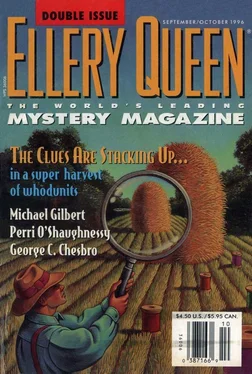Doug Allyn - v108 n03-04_1996-09-10
Здесь есть возможность читать онлайн «Doug Allyn - v108 n03-04_1996-09-10» весь текст электронной книги совершенно бесплатно (целиком полную версию без сокращений). В некоторых случаях можно слушать аудио, скачать через торрент в формате fb2 и присутствует краткое содержание. Город: Dell Magazines, Год выпуска: 1996, Издательство: Dell Magazines, Жанр: Детектив, на английском языке. Описание произведения, (предисловие) а так же отзывы посетителей доступны на портале библиотеки ЛибКат.
- Название:v108 n03-04_1996-09-10
- Автор:
- Издательство:Dell Magazines
- Жанр:
- Год:1996
- Город:Dell Magazines
- ISBN:нет данных
- Рейтинг книги:4 / 5. Голосов: 1
-
Избранное:Добавить в избранное
- Отзывы:
-
Ваша оценка:
- 80
- 1
- 2
- 3
- 4
- 5
v108 n03-04_1996-09-10: краткое содержание, описание и аннотация
Предлагаем к чтению аннотацию, описание, краткое содержание или предисловие (зависит от того, что написал сам автор книги «v108 n03-04_1996-09-10»). Если вы не нашли необходимую информацию о книге — напишите в комментариях, мы постараемся отыскать её.
v108 n03-04_1996-09-10 — читать онлайн бесплатно полную книгу (весь текст) целиком
Ниже представлен текст книги, разбитый по страницам. Система сохранения места последней прочитанной страницы, позволяет с удобством читать онлайн бесплатно книгу «v108 n03-04_1996-09-10», без необходимости каждый раз заново искать на чём Вы остановились. Поставьте закладку, и сможете в любой момент перейти на страницу, на которой закончили чтение.
Интервал:
Закладка:
“Tea?” inquired Captain Ariunbat. He grasped the teapot with pudgy fingers encircled by several heavy-looking rings. He was heavy himself, and soft-looking. Perhaps that was why he had chosen to suffix his name with “bat,” which in Mongolian means “solid.” Dorj settled into a metal folding chair in front of the cluttered metal desk in his host’s sparsely furnished office and accepted a cup of salty, milky tea. He had not really expected to be visiting police headquarters during his vacation. It too brought back memories.
“I apologize for interrupting your vacation,” said Ariunbat. “But since you were on the scene shortly after the murder—”
“It’s all right,” said Dorj, not meaning it.
“You were in Chinatown for the celebration?”
“Actually I was taking a walk.” More like a pilgrimage, Dorj thought to himself. “I once knew someone who lived in the area.”
Dorj didn’t remember the captain. He wondered from which aimag he’d been transferred. He had the grayish blue eyes and vaguely Western look of a native Kazakh.
“The dead man,” resumed Ariunbat, “was a Mr. Deng Liu. One of the leading lights of the Chinese community here in the capital.”
“An entrepreneur,” said Dorj. “I understood he owned several Dollar Shops — quite lucrative until the new government required them to accept tugriks rather than dollars. Didn’t he also have interests in mining ventures?”
Ariunbat regarded Dorj with some surprise. “You seem well informed. But, of course, you once worked here.”
“I was fortunate enough to dine with Liu and his family a couple of times. Oddly enough, the last time was also as the year turned. I remember we had Nien Fan, one of those traditional dishes for the occasion. It was rice with dried fruit, and a persimmon perched on top.”
“Persimmon?”
“Well, as we know, he is, was, well off. I must admit I didn’t care for the taste much.” Dorj sipped his salty tea.
“No. The Chinese have strange tastes.” Ariunbat leafed slowly through the papers on his desk, as if it were an effort. “At any rate, Mr. Liu died around three o’clock this afternoon at the Russian Polyclinic. He was shot — as you know — around two P.M. — ” The Captain paused. “In what used to be Gorky Street. Though they’ve gone and renamed it, I understand. Did you notice a sign?”
“No,” said Dorj. “All the signs seem to have vanished. Any idea who the murderer might be?”
Ariunbat gave a tired shrug. “Probably one of his countrymen, although there’s a lot of bad blood between the Chinese and our people.”
“They seem to have caught on to this free enterprise idea more quickly than we did,” noted Dorj.
Ariunbat ignored the remark. He stirred some extra milk into his cup of tea. He said, “A few months ago we tracked down a man who’d embezzled from Liu, a man named Chi, so it isn’t beyond reason that — well — Chi killed himself, you see, couldn’t stand the shame and did the honorable thing. Jumped into the Tuul. Left two sons and an ailing wife. So maybe it’s revenge. We’ve questioned Lui’s family. He had a daughter — Song Liu — although his wife was dead. But then, you probably know that.”
“Yes,” agreed Dorj. “She was just a child when I knew him.”
“She’s engaged now,” said Ariunbat. “Works in a bookstore near the park. She gave a statement. She says that her father had been unwell, and was rather distracted this morning. He went out about nine, saying he would be back later, but of course he never returned.”
“What about the notebook?” asked Dorj.
“Oh yes.” From under a pile of papers, he produced a pocket-size, leather-bound notebook. “Did you get a chance to examine it when you picked it up?”
“I only glanced at it.”
Ariunbat pushed the book across his cluttered desk, ignoring the papers which fell on the floor. “What do you make of it?”
Dorj picked the book up and opened it at the space allotted for that day, where there was a small drawing of a fish with wavy lines around its head.
Ariunbat said, “There are other days marked the same way, about every three weeks this past year. Some kind of Chinese accounting method?”
Dorj pondered a moment. “Did the daughter know anything about these fish markings?”
“No, except that she said it was a ‘mei ren yu,’ whatever that is.”
“You have to say it rather more nasally,” said Dorj. He looked out the window for a moment, not seeing Central Square and the heroic statue of Sukhe Baatar, but thinking instead of a young Chinese girl who had coached him in Mandarin for a regrettably brief time. Mai’s lessons had been considerably less formal than those conducted by his Soviet instructors at the Mongolian State University. “As to what it means,” he said, “it means ‘beautiful lady fish,’ or, in other words, a mermaid.”
“A mermaid? But we’re nowhere near an ocean! And how is it you speak a bit of Mandarin anyway?” Ariunbat made it sound like an accusation.
Dorj smiled uncomfortably. He did not care to share much of his past with the man. “It was a personal interest of mine, once,” he said.
Ariunbat tapped his cup slowly. “But why a mermaid?”
“It’s puzzling. Many Chinese mariners consider them unlucky. Liu was such a traditionalist that I can’t see him starting the new year by inscribing an unlucky symbol into his diary for the very day that it begins, so there must have been a more pressing reason. I would guess it was a memory aid.”
“Well,” said Ariunbat, “considering your obvious interest in Chinese culture, I’m sure I could use your assistance in interviewing the daughter.”
“Ah,” said Dorj, wishing he hadn’t mentioned the persimmon.
The next morning Dorj accompanied Ariunbat to the northern suburb where the late Mr. Liu’s daughter lived. They bicycled. Fuel was too scarce to squander except in emergencies. Ariunbat rode a fancy ten-speed model, while Dorj had to content himself with a battered police issue with balloon tires. Despite his bulk, Ariunbat pedaled expertly, even braking neatly to avoid a cow grazing on some frozen grass in front of the Altai Hotel. He wore a set of headphones and Dorj wondered what he was playing on his portable cassette machine, but didn’t ask.
Song Liu lived in the fourth in a line of gers. Dorj had always preferred his solid, cozy — and thankfully square — apartment to the traditional circular, tentlike structures of white felt. But, he knew, most Mongolians aspired to their own suburban gers, complete with electricity.
The policemen left their bicycles beside the gate of the fenced-in yard surrounding the ger. Ariunbat knocked on the elaborately carved wooden door. Song Liu answered. She was a pale, pretty girl, not unlike Mai, Dorj thought.
“Wai,” said Dorj, dredging his memory for the greeting.
“You speak some Chinese, too?” The words were spoken in English by a large, overhearty American who appeared suddenly beside the Chinese girl. His handshake almost dislocated Dorj’s arm. “Pleased to meet you, Inspector,” his new acquaintance twanged. “Myrori: Young’s the name, here’s my card. Song here has been teaching me the odd phrase.”
“Sorry to disturb you,” said Ariunbat, in Mongolian. “We’ll try to be brief.”
The two policemen and Song took wooden chairs beside the stove in the center of the ger. Young positioned himself protectively behind Song’s chair. Dorj noticed that the shelves and tables that sat against the ger s crisscrossed wooden framework were burdened incongruously with the type of bric-a-brac usually found in tourist shops.
Читать дальшеИнтервал:
Закладка:
Похожие книги на «v108 n03-04_1996-09-10»
Представляем Вашему вниманию похожие книги на «v108 n03-04_1996-09-10» списком для выбора. Мы отобрали схожую по названию и смыслу литературу в надежде предоставить читателям больше вариантов отыскать новые, интересные, ещё непрочитанные произведения.
Обсуждение, отзывы о книге «v108 n03-04_1996-09-10» и просто собственные мнения читателей. Оставьте ваши комментарии, напишите, что Вы думаете о произведении, его смысле или главных героях. Укажите что конкретно понравилось, а что нет, и почему Вы так считаете.












